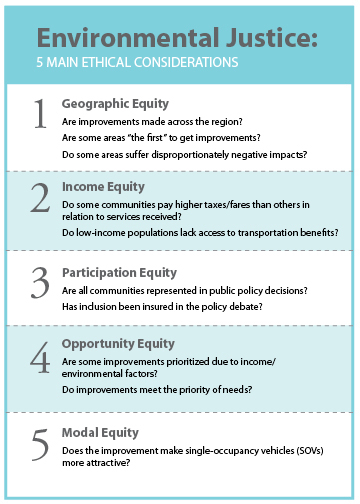Determining environmental justice involves looking at the benefits and potential negative impacts on minority and low-income populations from proposed infrastructure investments.
What’s the Problem?
The Texas Department of Transportation (TxDOT) and the Camino Real Regional Mobility Authority (CRRMA) are currently constructing toll lanes in El Paso along the César Chávez Border Highway, with plans to construct additional managed lanes. A high number of residents in this community live below the poverty level, with many of them adjacent to the proposed facilities. The toll lanes could severely impact these populations under the auspices of environmental justice (EJ). Determining EJ involves looking at the benefits and potential negative impacts on minority and low-income populations from proposed infrastructure investments. When constructing toll lanes, TxDOT must consider EJ issues in terms of access, benefits, and impacts of the facility on the entire surrounding community, including impoverished neighborhoods.
What’s the Solution?
TxDOT and the CRRMA must balance addressing EJ issues with making enough money from tolls to meet the bond obligations used to fund the projects. This project assessed EJ concerns related to the area and offered options for TxDOT to use in establishing tolling policies that consider the needs of the lower-income populations in the El Paso region, while keeping in mind the need to recover bonded construction costs.
How Was the Study Done?
Regarding toll rates, TTI used a state-of-the-art simulation-based dynamic traffic assignment modeling methodology. After analyzing baseline static toll rates, researchers assessed variable pricing (i.e., toll rates changing based on time-of-day) and modeled a scenario using an innovative algorithm that dynamically changes tolling rates according to managed lanes’ speed. This allowed researchers to determine which option maximizes revenue.
Regarding EJ issues, TTI used Geographic Information Systems (GIS) and demographic data to identify low-income populations within the border region and mapped these to corresponding traffic analysis zones. Values-of-time were adjusted to determine how often drivers in these areas were diverting to non-tolled facilities. Researchers then compared the diversion trends and assessed any potential changes in transportation service within the region.
Findings
Researchers found that the César Chávez lanes should benefit income classes equitably without substantially impacting bike/pedestrian safety, air pollution, or—with noise abatement measures in place—noise pollution. TxDOT’s history of public engagement regarding the project will likely continue. Regarding modal equity—or travelers choosing a single- versus multi-occupancy vehicle mode of travel—researchers found no benefit/incentive for multi-occupant travelers unless high occupancy is considered for future operations and toll rates. The project also outlined potential tolling policies for the border region.
Benefits
TxDOT can use the study’s findings to better understand and avoid negatively impacting impoverished communities both for this project and others with similar demographic contexts. Additionally, the initial tolling policy options outlined by researchers can potentially help the CRRMA secure funding for future transportation projects in the region.
Project Title
Addressing Environmental Justice Concerns When Developing Tolling Policies for the Border RegionProject Number
186053-00004
Project Sponsor(s)
Center for International Intelligent Transportation Research
Project Categories
Environment, Infrastructure
Project Termination Date
October 2013
Project Publications
For More Information
Jeffrey Adam Shelton
Associate Research ScientistResearch and Implementation - El Paso – Suite 151
Texas A&M Transportation Institute
The Texas A&M University System
4050 Rio Bravo Dr.
El Paso, TX 79902
Ph. (915) 532-3759
j-shelton@tamu.edu
